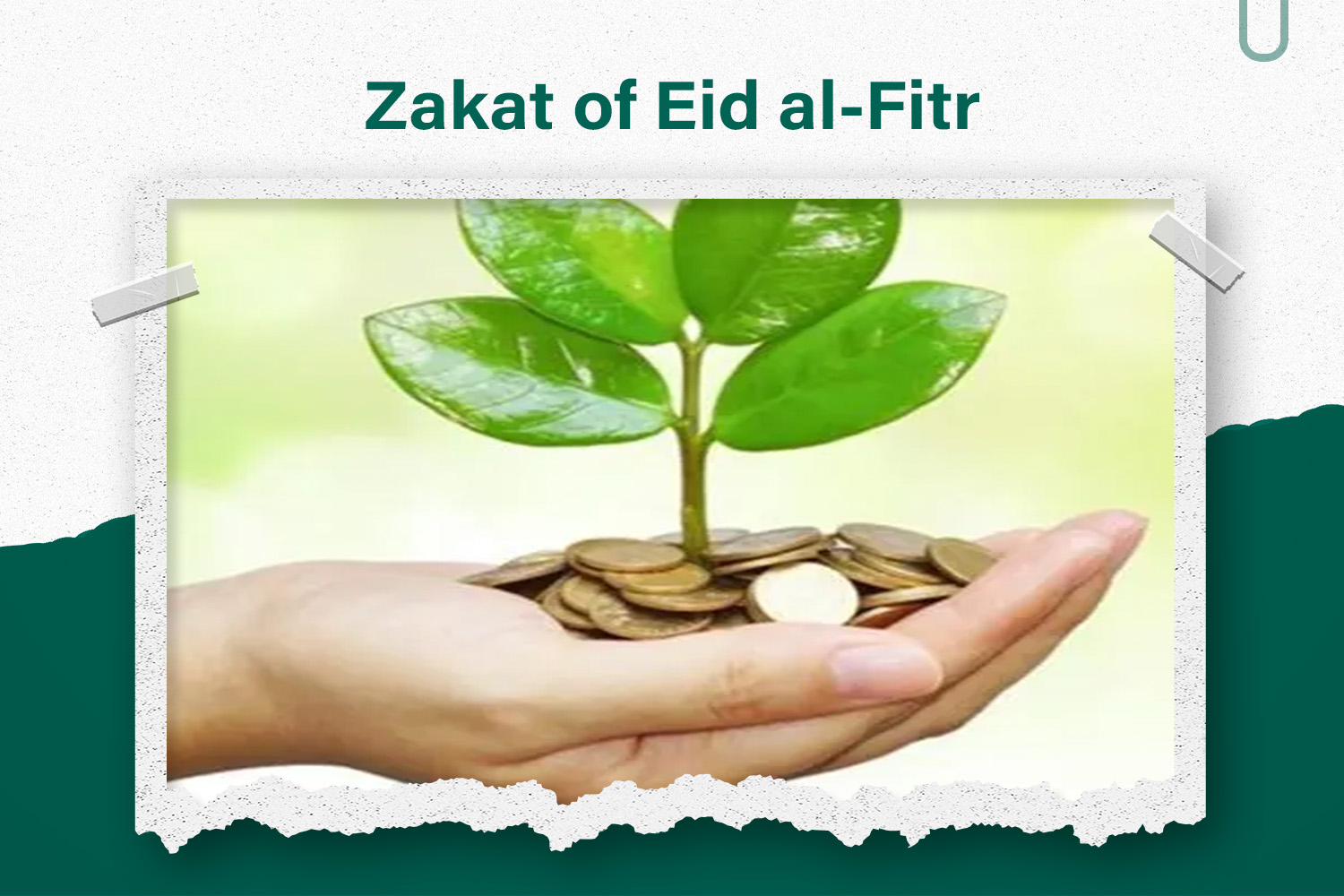Zakat of Eid al-Fitr is the reparation of the defect in fasting, as prostration of omissions forces the defect in prayer, the fasting person may fall in the month of Ramadan with some violations that scratch the perfection of fasting
We present to you within the article today, the concept of Eid al-Fitr Zakat, its charitable goals, the terms and conditions of Eid al-Fitr zakat in Islam, and we stand together on the impact of Eid al-Fitr Zakat on achieving social solidarity and what are the most important spiritual and social benefits of Eid al-Fitr Zakat.
Your presence with us at the Ahad and your support for us is a cause of pride, to pour all efforts and collect the largest amount of donations and assistance for the advancement of poor peoples in Africa in accordance with our charitable projects that have borne fruit thanks to you.
Zakat of Eid al-Fitr
Zakat al-Fitr is one of the types of Zakat due to Muslims, paid before the Eid al-Fitr prayer, or before the end of the fasting month of Ramadan, and it is obligatory on every Muslim, capable of it, regardless of age or gender.
Zakaah for Eid al-Fitr or Sadaqat al-Fitr is zakaah for life; it is a known amount of charity, from a special person, under special conditions, which is obligatory with the breaking of Ramadan, purification for the fasting: from moonshine, raffath, and food for the poor.
The sun must set from the night of Eid, the time of breaking the fast and the end of the fasting month of Ramadan, until just before the performance of the Eid al-Fitr prayer.

Zakat of Eid al-Fitr
In the same context, we remind you of the conditions for issuing zakat for Eid al-Fitr:
Zakat al-Fitr should be regular: that is, it should not be zakat for the year or half, but it is Zakat al-Fitr only.
The money allocated for Zakat must be halal: because it is not permissible to pay zakat from haraam money, and the money paid for Zakat must belong to the person who pays it.
Spending on the needy: the money allocated for Zakat must be handed over to the needy who are in need of that Zakat.
Consent of the Muslim ruler: Zakat al-Fitr must be paid with the consent of the Muslim ruler or his representative.
Zakat al-Fitr must be taken out on time, which is one or two days at most before the Eid prayer, and if the output is delayed after this time, it is not accepted as zakat.
Important titles we have selected for you within the article:
Zakat of Eid al-Fitr
The concept of Eid al-Fitr Zakat and its charitable goals
Terms and conditions of Zakat Eid al-Fitr in Islam
The impact of Eid al-Fitr Zakat on achieving social solidarity
Spiritual and social benefits of Eid al-Fitr Zakat
The concept of Eid al-Fitr Zakat and its charitable goals
Zakat al-Fitr is the Zakat caused by the Fitr of Ramadan, and it was imposed in the second year of hijra, which is the year in which fasting was imposed, and the difference between it and other zakat is that it was imposed on people, not money, and therefore it does not require what is required for other zakat of Nisab and about and so on.
The concept of Eid al-Fitr Zakat and its charitable goals can be summarized as follows:
Zakat cleanses the same Muslim from the disease of scarcity and stinginess and breaks the intensity of his love of money and treasure and prevent it from those in need.
Reparation and supplementation: every fasting person falls into his fast out of absence, Gossip, curiosity to talk and look at what happens, so alms-giving comes to the Fitr to make up for the shortage and complete the reward and reward for the fasting person.
Takaful and enrichment: one of the purposes of Zakat in general and al-Fitr in particular is the Takaful and cooperation of Muslims, supporting the support of the rich for the poor, feeling their needs and seeking relief from them.
Thanks and giving: when a Muslim pays Zakat al-Fitr, he thanks Allah for the grace of completing the fast, doing and reaching Ramadan and being successful in it for the obeisances, and thanks Allah for the grace of the left and the subsistence, and accustoms himself to thanking the blessings by giving and giving.
General joy of Eid: Zakat al-Fitr has been initiated to spread the joy of Eid to all members of society, so that the rich and affluent do not rejoice in it and the poor and destitute are deprived of it, the symbiotic human meaning must appear in Muslim holidays.
Terms and conditions of Zakat Eid al-Fitr in Islam
Zakat al-Fitr is Zakat that was imposed on Muslims, and adding Zakat to the Fitr is from adding something for its reason, and the Fitr of Ramadan is the reason for its obligation, and it was imposed in the second year of hijra.
Ramadan ends with one of the great celebrations held in the Muslim Year, Eid al-Fitr.
Who is on the day of prayer, every Muslim everywhere should greet him with a duty charity work, congregational prayer and holding a feast.

Zakat of Eid al-Fitr
The zakat of Eid al-Fitr was imposed by agreement of the audience of Jurists, and the evidence of its hypothesis is the Hadith of Ibn ‘ Umar (may Allah be pleased with him) about them who said: “the messenger of Allah (peace and blessings of Allah be upon him) imposed Zakat al-Fitr from dates or from barley on slave, free, Male, Female, Young and Old Muslims,” al-Bukhari.
The terms and conditions of zakaah for Eid al-Fitr in Islam are obligatory for the young and the old, male and female, and it is not obligatory for the unborn child unless he starts screaming before dawn on the day of Eid, if he volunteers it for him, it’s okay, and it must be taken out for himself, as well as for those who need his supplies from a wife or relative.
A man does not pay for his non-Muslim wife in front of the audience of Jurists, and he must pay her, because even if she is not deaf, her husband is obliged to pay for her, and by paying for her, a purpose of food for the poor and the poor is achieved, which is more appropriate to compose her heart and expand the circle of giving.
As for those for whom Zakat al-Fitr is not obligatory in Islam, there are three identified by Dar Al-Ifta, namely:
A poor man who has no food for his day.
The fetus is not born before the sunset of the night of Eid.
The deceased who died before sunset on the last day of Ramadan.
The impact of Eid al-Fitr Zakat on achieving social solidarity
Islam is a religion of affection and love, a religion of intimacy and meeting, a religion of solidarity and interdependence between people, all of them are Adam and all of them are male and female, and in this paragraph we mention the great role of the impact of Eid al-Fitr Zakat on achieving social solidarity.
Zakaah on Eid al-Fitr is obligatory on every Muslim man or woman who has an amount in addition to his strength and the strength of those he needs to spend on the day and night of Eid, in addition to his dwelling, furniture, and original needs.
As Abu Hanifa said, by analogy with Zakat on money, because instinct is related to the body, and zakat is related to money, so parting, and not requiring wealth to get it out achieves an educational and moral purpose in society, which is to train a Muslim to spend in good times and bad.
But Sadaqat al-Fitr expanded the circle of giving and solidarity and did not stipulate in its motive that the required amount of wealth should be reached in the motive of the imposed Zakat, so Zakat al-Fitr was initiated on Eid al-Fitr, and the sacrifice on Eid al-Adha and the monitoring of the great remuneration for the two rites in order to bring pleasure to people and make amends to their thoughts.
The mosque construction projects at AHAD are an integral part of our educational and social projects and include the construction of buildings, chapels and other subsequent facilities such as water wells, ablutions and other facilities to perform worship and promote communication and social coexistence.
Spiritual and social benefits of Eid al-Fitr Zakat
As the Prophet (peace and blessings of Allaah be upon him) said: it is “purifying the fasting person from slander and slander,” that is, it erases what a Muslim may commit in Ramadan from the legitimate ends of his fasting.
In this paragraph, we remind you of the spiritual and social benefits of Eid al-Fitr Zakat, including:
Cleansing the fasting person: taking out Zakat al-Fitr cleanses the fasting person from mistakes and harm that may have occurred in his fasting.
Atonement for mistakes and sins: it is believed that giving Zakat al-Fitr atones for mistakes and sins that may have been committed during Ramadan.
Helping the needy: the amount of Zakat al-Fitr is used to help the needy and the poor get food and basic necessities during Eid al-Fitr.
Enhancing the social spirit: giving Zakat al-Fitr enhances the social spirit and solidarity among community members by distributing money to the poor and needy.
Achieving happiness and blessing: it is believed that giving Zakat al-Fitr contributes to achieving happiness and blessing in life and brings mercy and goodness from Allah.
Titles related to the article:
Zakat of Eid al-Fitr
The concept of Eid al-Fitr Zakat and its charitable goals
Terms and conditions of Zakat Eid al-Fitr in Islam
The impact of Eid al-Fitr Zakat on achieving social solidarity
Spiritual and social benefits of Eid al-Fitr Zakat
Frequently asked questions:
Is it permissible to pay Zakat al-Fitr in cash
When paying Zakat al-Fitr in cash, we say that it is permissible to pay it in cash, which is more likely for people today, especially Muslims in the West, because it is easier for them, more beneficial for the poor, and faster to transfer it to his family.
Is Zakat al-Fitr money or food
What Dar Al-Azhar has stated in its fatwa: the basic principle is that Zakat al-Fitr should be given out as food, and it is permissible to give out the value in money.
What is the ruling on who did not give Zakat al-Fitr
Answer: he performs it, repents to Allah, a portion of which he spends a judgment, and he has to repent to Allah and be divided. Question: is he guilty of this Answer: sin, yes. It is not permissible for him to delay, the Prophet (peace and blessings of Allaah be upon him) ordered it to be performed before people go out to pray.
ALSO READ:




